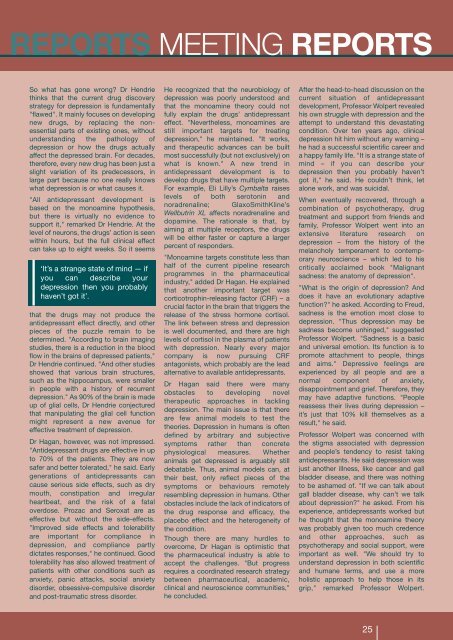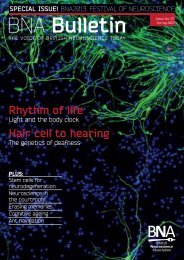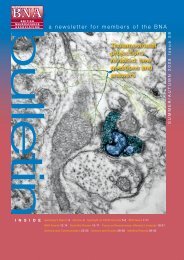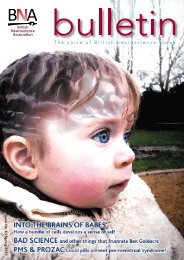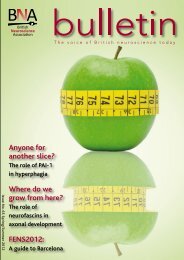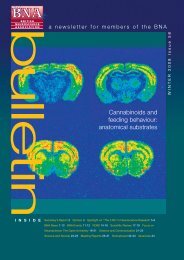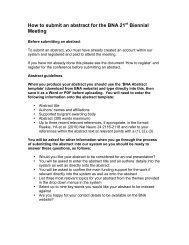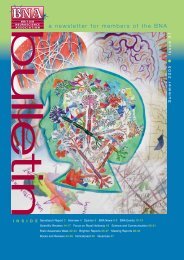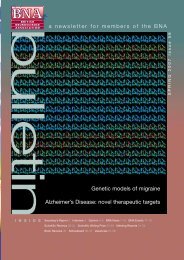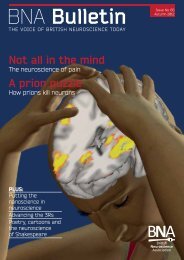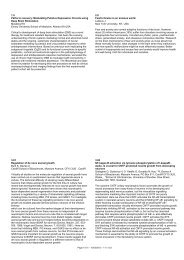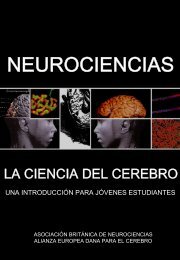a newsletter for members of the BNA - British Neuroscience ...
a newsletter for members of the BNA - British Neuroscience ...
a newsletter for members of the BNA - British Neuroscience ...
Create successful ePaper yourself
Turn your PDF publications into a flip-book with our unique Google optimized e-Paper software.
REPORTS MEETING REPORTS<br />
So what has gone wrong? Dr Hendrie<br />
thinks that <strong>the</strong> current drug discovery<br />
strategy <strong>for</strong> depression is fundamentally<br />
"flawed". It mainly focuses on developing<br />
new drugs, by replacing <strong>the</strong> nonessential<br />
parts <strong>of</strong> existing ones, without<br />
understanding <strong>the</strong> pathology <strong>of</strong><br />
depression or how <strong>the</strong> drugs actually<br />
affect <strong>the</strong> depressed brain. For decades,<br />
<strong>the</strong>re<strong>for</strong>e, every new drug has been just a<br />
slight variation <strong>of</strong> its predecessors, in<br />
large part because no one really knows<br />
what depression is or what causes it.<br />
"All antidepressant development is<br />
based on <strong>the</strong> monoamine hypo<strong>the</strong>sis,<br />
but <strong>the</strong>re is virtually no evidence to<br />
support it," remarked Dr Hendrie. At <strong>the</strong><br />
level <strong>of</strong> neurons, <strong>the</strong> drugs’ action is seen<br />
within hours, but <strong>the</strong> full clinical effect<br />
can take up to eight weeks. So it seems<br />
‘It’s a strange state <strong>of</strong> mind — if<br />
you can describe your<br />
depression <strong>the</strong>n you probably<br />
haven’t got it’.<br />
that <strong>the</strong> drugs may not produce <strong>the</strong><br />
antidepressant effect directly, and o<strong>the</strong>r<br />
pieces <strong>of</strong> <strong>the</strong> puzzle remain to be<br />
determined. "According to brain imaging<br />
studies, <strong>the</strong>re is a reduction in <strong>the</strong> blood<br />
flow in <strong>the</strong> brains <strong>of</strong> depressed patients,"<br />
Dr Hendrie continued. "And o<strong>the</strong>r studies<br />
showed that various brain structures,<br />
such as <strong>the</strong> hippocampus, were smaller<br />
in people with a history <strong>of</strong> recurrent<br />
depression." As 90% <strong>of</strong> <strong>the</strong> brain is made<br />
up <strong>of</strong> glial cells, Dr Hendrie conjectured<br />
that manipulating <strong>the</strong> glial cell function<br />
might represent a new avenue <strong>for</strong><br />
effective treatment <strong>of</strong> depression.<br />
Dr Hagan, however, was not impressed.<br />
"Antidepressant drugs are effective in up<br />
to 70% <strong>of</strong> <strong>the</strong> patients. They are now<br />
safer and better tolerated," he said. Early<br />
generations <strong>of</strong> antidepressants can<br />
cause serious side effects, such as dry<br />
mouth, constipation and irregular<br />
heartbeat, and <strong>the</strong> risk <strong>of</strong> a fatal<br />
overdose. Prozac and Seroxat are as<br />
effective but without <strong>the</strong> side-effects.<br />
"Improved side effects and tolerability<br />
are important <strong>for</strong> compliance in<br />
depression, and compliance partly<br />
dictates responses," he continued. Good<br />
tolerability has also allowed treatment <strong>of</strong><br />
patients with o<strong>the</strong>r conditions such as<br />
anxiety, panic attacks, social anxiety<br />
disorder, obsessive-compulsive disorder<br />
and post-traumatic stress disorder.<br />
He recognized that <strong>the</strong> neurobiology <strong>of</strong><br />
depression was poorly understood and<br />
that <strong>the</strong> monoamine <strong>the</strong>ory could not<br />
fully explain <strong>the</strong> drugs’ antidepressant<br />
effect. "Never<strong>the</strong>less, monoamines are<br />
still important targets <strong>for</strong> treating<br />
depression," he maintained. "It works,<br />
and <strong>the</strong>rapeutic advances can be built<br />
most successfully (but not exclusively) on<br />
what is known." A new trend in<br />
antidepressant development is to<br />
develop drugs that have multiple targets.<br />
For example, Eli Lilly’s Cymbalta raises<br />
levels <strong>of</strong> both serotonin and<br />
noradrenaline; GlaxoSmithKline’s<br />
Wellbutrin XL affects noradrenaline and<br />
dopamine. The rationale is that, by<br />
aiming at multiple receptors, <strong>the</strong> drugs<br />
will be ei<strong>the</strong>r faster or capture a larger<br />
percent <strong>of</strong> responders.<br />
"Monoamine targets constitute less than<br />
half <strong>of</strong> <strong>the</strong> current pipeline research<br />
programmes in <strong>the</strong> pharmaceutical<br />
industry," added Dr Hagan. He explained<br />
that ano<strong>the</strong>r important target was<br />
corticotrophin-releasing factor (CRF) – a<br />
crucial factor in <strong>the</strong> brain that triggers <strong>the</strong><br />
release <strong>of</strong> <strong>the</strong> stress hormone cortisol.<br />
The link between stress and depression<br />
is well documented, and <strong>the</strong>re are high<br />
levels <strong>of</strong> cortisol in <strong>the</strong> plasma <strong>of</strong> patients<br />
with depression. Nearly every major<br />
company is now pursuing CRF<br />
antagonists, which probably are <strong>the</strong> lead<br />
alternative to available antidepressants.<br />
Dr Hagan said <strong>the</strong>re were many<br />
obstacles to developing novel<br />
<strong>the</strong>rapeutic approaches in tackling<br />
depression. The main issue is that <strong>the</strong>re<br />
are few animal models to test <strong>the</strong><br />
<strong>the</strong>ories. Depression in humans is <strong>of</strong>ten<br />
defined by arbitrary and subjective<br />
symptoms ra<strong>the</strong>r than concrete<br />
physiological measures. Whe<strong>the</strong>r<br />
animals get depressed is arguably still<br />
debatable. Thus, animal models can, at<br />
<strong>the</strong>ir best, only reflect pieces <strong>of</strong> <strong>the</strong><br />
symptoms or behaviours remotely<br />
resembling depression in humans. O<strong>the</strong>r<br />
obstacles include <strong>the</strong> lack <strong>of</strong> indicators <strong>of</strong><br />
<strong>the</strong> drug response and efficacy, <strong>the</strong><br />
placebo effect and <strong>the</strong> heterogeneity <strong>of</strong><br />
<strong>the</strong> condition.<br />
Though <strong>the</strong>re are many hurdles to<br />
overcome, Dr Hagan is optimistic that<br />
<strong>the</strong> pharmaceutical industry is able to<br />
accept <strong>the</strong> challenges. "But progress<br />
requires a coordinated research strategy<br />
between pharmaceutical, academic,<br />
clinical and neuroscience communities,"<br />
he concluded.<br />
After <strong>the</strong> head-to-head discussion on <strong>the</strong><br />
current situation <strong>of</strong> antidepressant<br />
development, Pr<strong>of</strong>essor Wolpert revealed<br />
his own struggle with depression and <strong>the</strong><br />
attempt to understand this devastating<br />
condition. Over ten years ago, clinical<br />
depression hit him without any warning –<br />
he had a successful scientific career and<br />
a happy family life. "It is a strange state <strong>of</strong><br />
mind – if you can describe your<br />
depression <strong>the</strong>n you probably haven’t<br />
got it," he said. He couldn’t think, let<br />
alone work, and was suicidal.<br />
When eventually recovered, through a<br />
combination <strong>of</strong> psycho<strong>the</strong>rapy, drug<br />
treatment and support from friends and<br />
family, Pr<strong>of</strong>essor Wolpert went into an<br />
extensive literature research on<br />
depression – from <strong>the</strong> history <strong>of</strong> <strong>the</strong><br />
melancholy temperament to contemporary<br />
neuroscience – which led to his<br />
critically acclaimed book "Malignant<br />
sadness: <strong>the</strong> anatomy <strong>of</strong> depression".<br />
"What is <strong>the</strong> origin <strong>of</strong> depression? And<br />
does it have an evolutionary adaptive<br />
function?" he asked. According to Freud,<br />
sadness is <strong>the</strong> emotion most close to<br />
depression. "Thus depression may be<br />
sadness become unhinged," suggested<br />
Pr<strong>of</strong>essor Wolpert. "Sadness is a basic<br />
and universal emotion. Its function is to<br />
promote attachment to people, things<br />
and aims." Depressive feelings are<br />
experienced by all people and are a<br />
normal component <strong>of</strong> anxiety,<br />
disappointment and grief. There<strong>for</strong>e, <strong>the</strong>y<br />
may have adaptive functions. "People<br />
reassess <strong>the</strong>ir lives during depression –<br />
it’s just that 10% kill <strong>the</strong>mselves as a<br />
result," he said.<br />
Pr<strong>of</strong>essor Wolpert was concerned with<br />
<strong>the</strong> stigma associated with depression<br />
and people’s tendency to resist taking<br />
antidepressants. He said depression was<br />
just ano<strong>the</strong>r illness, like cancer and gall<br />
bladder disease, and <strong>the</strong>re was nothing<br />
to be ashamed <strong>of</strong>. "If we can talk about<br />
gall bladder disease, why can’t we talk<br />
about depression?" he asked. From his<br />
experience, antidepressants worked but<br />
he thought that <strong>the</strong> monoamine <strong>the</strong>ory<br />
was probably given too much credence<br />
and o<strong>the</strong>r approaches, such as<br />
psycho<strong>the</strong>rapy and social support, were<br />
important as well. "We should try to<br />
understand depression in both scientific<br />
and humane terms, and use a more<br />
holistic approach to help those in its<br />
grip," remarked Pr<strong>of</strong>essor Wolpert.<br />
25


